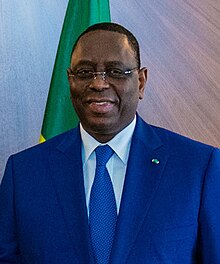This article needs to be updated. (July 2024) |
Macky Sall | |
|---|---|
| 𞤃𞤢𞤳𞤭 𞤅𞤢𞤤 | |
 Sall in 2020 | |
| 4th President of Senegal | |
| In office 2 April 2012 – 2 April 2024 | |
| Prime Minister | |
| Preceded by | Abdoulaye Wade |
| Succeeded by | Bassirou Diomaye Faye |
| 8th Prime Minister of Senegal | |
| In office 21 July 2004 – 19 June 2007 | |
| President | Abdoulaye Wade |
| Preceded by | Idrissa Seck |
| Succeeded by | Cheikh Hadjibou Soumaré |
| President of the National Assembly | |
| In office 20 June 2007 – 9 November 2008 | |
| Preceded by | Pape Diop |
| Succeeded by | Mamadou Seck |
| Mayor of Fatick | |
| In office 1 April 2009 – 2 April 2012 | |
| Deputy | Famara Sarr |
| Preceded by | Doudou Ngom |
| Succeeded by | Famara Sarr |
| In office 1 June 2002 – 9 November 2008 | |
| Deputy | Souleymane Ndéné Ndiaye |
| Preceded by | Doudou Ngom |
| Succeeded by | Doudou Ngom |
| 20th Chairperson of the African Union | |
| In office 5 February 2022 – 18 February 2023 | |
| Preceded by | Félix Tshisekedi |
| Succeeded by | Azali Assoumani |
| Personal details | |
| Born | 11 December 1961 Fatick, Senegal |
| Political party | Senegalese Democratic Party (Late 1980s–2008) Alliance for the Republic (2008–present) |
| Spouse | Marieme Faye Sall |
| Alma mater | Cheikh Anta Diop University[citation needed] Institute of French Petroleum |
Macky Sall (French pronunciation: [maki sal], Wolof: Maki Sàll, Pulaar: 𞤃𞤢𞤳𞤭 𞤅𞤢𞤤, romanized: Maki Sal; born 11 December 1961[1]) is a Senegalese politician who served as the fourth president of Senegal from 2012 to 2024. He previously served as the eighth prime minister from 2004 to 2007, under President Abdoulaye Wade and president of the National Assembly from 2007 to 2008.[2]
Sall served as the Mayor of Fatick from 2002 to 2008 and held that post again from 2009 to 2012. He was a long-time member of the Senegalese Democratic Party (PDS). After coming into conflict with Wade, he was removed from his post as President of the National Assembly in November 2008; he consequently founded his own party named the Alliance for the Republic (APR) and joined the opposition. Placing second in the first round of the 2012 presidential election, he won the backing of other opposition candidates and prevailed over Wade in the second round of voting, held on 25 March 2012.[3] He is the first president born after Senegalese independence from France.
Under Sall's leadership, significant infrastructure projects, including a new airport and town near Dakar, highways, express trains, a national stadium, and a road link to Mali, were completed. Throughout his tenure, there was a steady growth in the country's economy, with the annual GDP increasing from $17 billion to $27 billion. Internationally, he earned praise for his diplomatic efforts, advocating for African debt cancellation, bolstering anti-terrorism measures, and condemning military coups. He also contributed to resolving conflicts in the country's Casamance region and played a crucial role in ousting dictator Yahya Jammeh in neighboring Gambia in 2017.[4]
- ^ "Official Senegalese government page for Sall" (in French). 2006. Archived from the original on 27 March 2007. Retrieved 12 February 2007.
- ^ "Les anciens présidents de l'Assemblée nationale" [Former Presidents of the National Assembly] (in French). Senegalese government website. Archived from the original on 16 November 2008. Retrieved 23 November 2008.
- ^ "Senegal's President-elect Macky Sall hails 'new era'". BBC News. 26 March 2012. Archived from the original on 23 January 2017. Retrieved 25 March 2012.
- ^ "President Macky Sall rules out third-term re-election bid, spelling relief for tense Senegal". France 24. 4 July 2023. Retrieved 27 May 2024.